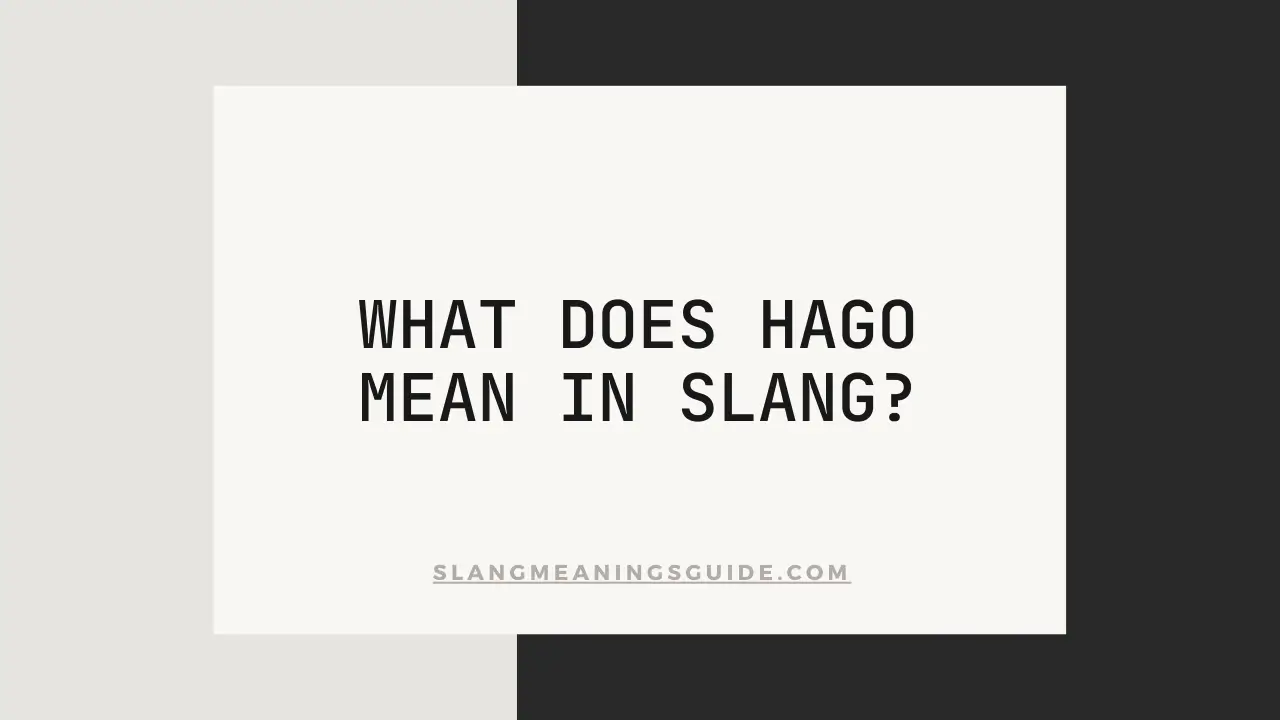| Please Wait Loading ..... |
 |

You’ve probably encountered “hago” while texting or scrolling through social media and wondered about its actual meaning. People use “hago” as a friendly shorthand in texting and messaging today. But what does “hago” mean in slang?
Our guide explains the background and usage of “hago” while teaching you how to incorporate it naturally into your conversations.
In slang, “hago” has become a versatile and simple expression, used primarily to highlight effort, action, or sarcasm. Its meaning can vary based on the context:
| Context | Meaning of “Hago” | Example Usage |
| Literal (Spanish) | “I do” or “I make” | Yo hago la comida hoy (I’ll make the food today). |
| Casual (English) | A humorous response indicating action | “Hago what I want!” |
| Slang (English) | Playful term implying effort or initiative | “Let’s get it done. Hago!” |
As shown above, “hago” in slang often carries a lighthearted vibe, making it ideal for casual chats.
“Hago” stems from the Spanish word meaning “I do.” While its literal usage remains the same in Spanish, its slang interpretation in English has shifted toward a playful, modern tone.
The spread of “hago” in digital spaces like TikTok, Instagram, and Twitter has cemented its role in casual conversations. As more people from diverse linguistic backgrounds interact online, words like “hago” naturally gain cross-cultural appeal.
“Hago” can replace other terms in specific scenarios:
Examples:
Here are a few ways “hago” can fit naturally into everyday scenarios:
| Situation | Example Sentences |
| Encouragement | Feeling Lazy? Hago it happened anyway!” |
| Work Motivation | “Big deadline today? Hago it shines!” |
| Casual Chit-Chat | “Plans for the weekend? Hago it’s fun!” |
| Sarcasm | Cooking dinner ? Hago it’s edible this time!” |
Here are examples of how “hago” can seamlessly fit into different scenarios:
The term “hago” is gaining traction for several reasons. It’s short and perfect for quick, informal communication, making it highly convenient. Its playful tone adds a sense of humor and fun to conversations. Additionally, with online interactions blending languages and cultures, words like “hago” naturally spread and evolve, further increasing their popularity.
Let’s compare “hago” with other popular slang terms to see how it stands out:
| Slang Term | Meaning | Key Difference from ‘Hago’ |
| “YOLO” | You only live once | Focuses on risk-taking rather than action |
| “Hustle” | Work hard to achieve something | Implies intense effort; “hago” is more lighthearted. |
| “Hago” | Emphasizes casual, playful action | Perfect for informal or humorous contexts. |
Each offers a similar meaning but may lack the unique charm of “hago.”
Slang terms like “hago” connect people through shared humor and simplicity by providing a shorthand for complex ideas, enhancing communication. They strengthen group identity through shared usage and add humor, lightening the tone of conversations and making interactions more enjoyable.
What does “hago” mean in slang? Everyone uses it to create connection through effort and humor in our daily interactions. You can bring lightness into any conversation by using “hago” whether you talk to friends in person or share messages online.
So, embrace the charm of “hago” in your interactions. It’s not just a slang term; it’s a way to bring a little humor and effort into your communication. Next time you’re tackling a task or sharing a laugh with friends, “hago” it count!
Comments